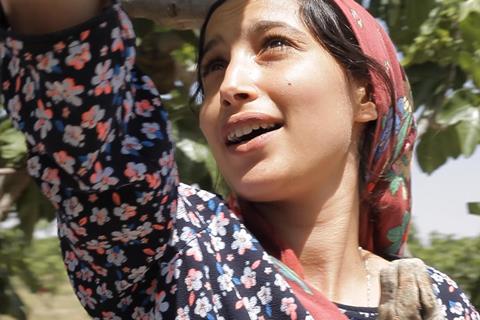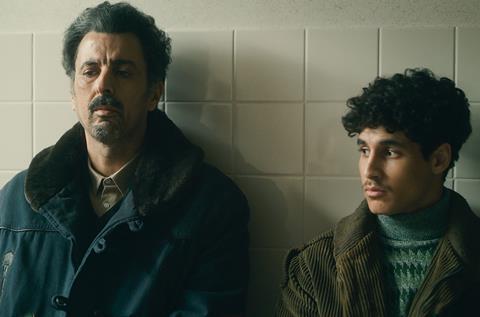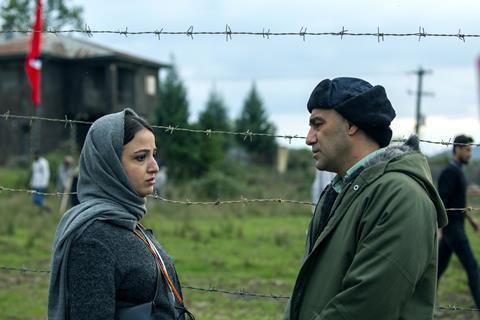Africa and the Middle East scored only one spot between them on the Oscar shortlist of 15 titles last year — with Iran’s A Hero — and no nominations. Screen assesses the two regions’ contenders seeking a better outcome this time around

Africa
Africa’s international feature list is down on recent years. At time of press, only eight African nations have submitted to the Oscar category, compared to 10 in 2022 and 12 in 2021. Despite increased presence from major streamers on the continent and thriving local industries such as Nigeria’s Nollywood, a move to the global awards stage has proved fitful, with few African titles selected in competition at major festivals, especially from Black filmmakers.
This reduces Africa’s chances of adding to its three awards for this category (all when it was called the best foreign-language film Oscar): for Costa-Gavras’ Algerian title Z in 1970; Jean-Jacques Annaud’s Black And White In Color for the Ivory Coast in 1977; and Gavin Hood’s Tsotsi for South Africa in 2006.
South African filmmaker Hood and Egypt-born Israeli director Moshé Mizrahi (his film Madame Rosa won for France in 1978) are the only Africa-born directors to claim the prize. No Black director has ever won the award — with Ladj Ly (France’s Les Misérables in 2020) and Abderrahmane Sissako (Mauritania’s Timbuktu in 2015) the only Black directors to be nominated.

Within this context, Senegal has a relatively strong record: two of its three previous submissions made the mid-December Oscar shortlist. Alain Gomis’ Félicité did so in 2017, with Mati Diop’s Atlantics matching it two years later, having been widely considered a nomination contender.
This year, the West African nation has entered veteran filmmaker Moussa Sene Absa’s Xalé, in which an act of violence tears apart the family of two 15-year-old siblings. The Wolof-language film is adapted from Mandir N Thiaw’s novel Adama Et Awa, and debuted at the BFI London Film Festival in October.
Uganda enters the international feature Oscar for the first time with Morris Mugisha’s Tembele. Following a man who is pushed to the brink of madness by the death of his son, the drama picked up three awards at June’s Uganda Film Festival — best film, actor and supporting actor.
With Tug Of War, Tanzania is making only its second international feature entry, and its first for 21 years. Amil Shivji’s feature is adapted from Shafi Adam Shafi’s Swahili novel, in which a rebellious young revolutionary becomes involved with an Indian-Zanzibari girl escaping an oppressive marriage. It debuted in Toronto’s Discovery strand in 2021.
Two countries have plumped for genres typically underrepresented in the international feature category. From Kenya, Andrew Kaggia’s animated sci-fi TeraStorm follows a team of superheroes uniting to vanquish an ancient wizard who threatens to destroy the Earth with a mysterious artefact; while Cameroon has Dingha Young Eystein’s musical The Planters Plantation, in which a girl fights to save her late father’s legacy under the shadow of colonisation.
Six of the last 10 international feature Oscar winners had world premieres in Cannes, and Tunisia’s Directors’ Fortnight title Under The Fig Trees will look to increase that trend. Erige Sehiri’s fiction feature debut is an ensemble drama depicting the relationships of fruit pickers and their boss, set during a single hot day in a Tunisian orchard.
The country recorded Africa’s first international feature nomination in six years with Kaouther Ben Hania’s The Man Who Sold His Skin in 2021 — Tunisia’s best result from its eight entries prior to this year.
A familiar face returns for Algeria’s 2023 submission: French director Rachid Bouchareb, whose films often deal with France’s relationship with its former colony, represents Algeria in the international feature award for the eighth time, with Our Brothers. Launched in the festival’s Cannes Premiere section in May, the film is based on the true story of Malik Oussekine, a French-Algerian student who was passing by a protest against immigration restrictions in Paris in 1986 and was beaten to death by police.
Bouchareb has made more of Algeria’s 25 submissions than any other filmmaker, and secured three of its five nominations: Dust Of Life (1996), Days Of Glory (2007) and Outside The Law (2011).
Cannes was also the launchpad for Morocco’s Oscar submission: Maryam Touzani’s Un Certain Regard title The Blue Caftan, in which a tailor and his wife have their life disturbed by the arrival of a new apprentice. Touzani represented her country in 2020 with Adam. Morocco’s best performer from 17 previous entries was Roschdy Zem’s Omar Killed Me, which made the shortlist for the 2012 awards.
Middle East

Asghar Farhadi’s two wins in five years — for A Separation in 2012 and The Salesman in 2017 — remain the only films from the Middle East to have claimed the international feature/foreign-language film Oscar. The Iranian titles represent two of the seven nominations for the region in the last 11 ceremonies; Lebanon is the other leading light in that time, with nominations for Ziad Doueiri’s The Insult in 2018 and Nadine Labaki’s Capernaum in 2019.
The Middle East is attempting to flow new blood into the international film body. Of the eight directors/directing teams that represent the region this year, only two — Iraq and Lebanon — are entering directors who have previously represented their country on this stage. Three of the remaining six countries offer debut features, with another one submitting a second film.
This year has been traumatic for the Iranian film community. Directors Jafar Panahi, Mohammad Rasoulof and Mostafa Al-Ahmad were among those arrested in July, a move that has drawn continued condemnation from the international film scene.
Houman Seyyedi, director of Iran’s 2023 Oscar entry World War III, has reportedly been banned from travelling outside the country. The move is part of a government crackdown on prominent artists following mass protests at the death of Mahsa Amini while being detained by authorities for not wearing a hijab. Should Seyyedi’s film reach nomination, there would be significant global support for his attendance at the ceremony; regardless, the plight of Iran’s artists will remain in focus in the coming months.
World War III was one of five Iranian features to debut at Venice Film Festival this year — and won the best film award in the Horizons section. Starring Mohsen Tanabandeh, it follows a builder on a film set who, after being given a role in the film, must hide his on-set lover or risk losing her and the potential for film stardom.
Artist-filmmaker duo Joana Hadjithomas and Khalil Joreige’s Lebanese submission Memory Box went on a long festival tour following a competition debut at the online 2021 Berlinale, with stops at Shanghai, Melbourne, Karlovy Vary, London and Thessaloniki.
Saudi Arabia’s burgeoning film industry submits for the sixth time, and fourth consecutive year, with Mohamed Al Salman’s debut feature Raven Song. The coming-of-age comedy previously won a Saudi Film Commission competition for discovering new local talent; its world premiere will be in the feature competition at the country’s Red Sea Film Festival in December.
Israel-born Palestinian filmmaker Maha Haj becomes the third woman to represent Palestine in the international feature section, after Najwa Najjar and three-time entrant Annemarie Jacir. Cannes Un Certain Regard title Mediterranean Fever, Haj’s second feature after 2016’s Personal Affairs, concerns the unexpected friendship between a depressed writer and his neighbour — a smalltime crook.
Both Hebrew and Arabic dialogue feature in Israeli entry Cinema Sabaya, Orit Fouks Rotem’s debut feature about a group of Arab and Jewish women taking part in a video workshop, who are forced to challenge their beliefs. Despite a strong cinema culture, Israel has never won the international Oscar — and the most recent of its 10 nominations was in 2012 for Joseph Cedar’s Footnote.
In another example of the region’s cross-pollination, Jordan’s entry Farha is set in Palestine in 1948 — the year of the war that marked the beginning of the ongoing conflict with Israel. Jordanian actress Karam Taher plays a 14-year-old girl trapped in a pantry who watches as catastrophe consumes her home. Debut feature director Darin J Sallam’s film launched at Toronto in 2021.
Shawkat Amin Korki’s Iraqi entry The Exam centres on a young Kurdish-Iraqi woman preparing for a university entrance test, who receives help from her unhappily married older sister, only for the pair to become entangled in a society-wide network of corruption.
Bridging the gap between Europe and the Middle East, Turkey has chosen Kerr, a thriller about a murder in a small town, directed by homegrown filmmaker Tayfun Pirselimoglu.

























No comments yet